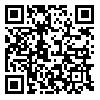Volume 13, Issue 6 (November & December 2022)
BCN 2022, 13(6): 755-764 |
Back to browse issues page
Download citation:
BibTeX | RIS | EndNote | Medlars | ProCite | Reference Manager | RefWorks
Send citation to:



BibTeX | RIS | EndNote | Medlars | ProCite | Reference Manager | RefWorks
Send citation to:
Fotooh Estahbanati M, Rezaeinasab M, Akbari Chermahini S, Mirzaeekia H, Azin M, Shamsizadeh A. The Effect of Involuntary Tactile Stimulation on the Creativity and Rey Auditory-Verbal Memory of Young Adults. BCN 2022; 13 (6) :755-764
URL: http://bcn.iums.ac.ir/article-1-2162-en.html
URL: http://bcn.iums.ac.ir/article-1-2162-en.html
Mahmood Fotooh Estahbanati1 

 , Maryam Rezaeinasab2
, Maryam Rezaeinasab2 

 , Soghra Akbari Chermahini3
, Soghra Akbari Chermahini3 

 , Hossein Mirzaeekia4
, Hossein Mirzaeekia4 

 , Mahdieh Azin2
, Mahdieh Azin2 

 , Ali Shamsizadeh *2
, Ali Shamsizadeh *2 




 , Maryam Rezaeinasab2
, Maryam Rezaeinasab2 

 , Soghra Akbari Chermahini3
, Soghra Akbari Chermahini3 

 , Hossein Mirzaeekia4
, Hossein Mirzaeekia4 

 , Mahdieh Azin2
, Mahdieh Azin2 

 , Ali Shamsizadeh *2
, Ali Shamsizadeh *2 


1- Kerman Neuroscience Research Center, Institute of Neuropharmacology, Kerman University of Medical Sciences, Kerman, Iran.
2- Physiology-Pharmacology Research Center, Research Institute of Basic Medical Sciences, Rafsanjan University of Medical Sciences, Rafsanjan, Iran.
3- Department of Psychology, Faculty of Human Science, Arak University, Arak, Iran.
4- Department of English Language, Estahban School of Paramedical Sciences, Shiraz University of Medical Sciences, Shiraz, Iran.
2- Physiology-Pharmacology Research Center, Research Institute of Basic Medical Sciences, Rafsanjan University of Medical Sciences, Rafsanjan, Iran.
3- Department of Psychology, Faculty of Human Science, Arak University, Arak, Iran.
4- Department of English Language, Estahban School of Paramedical Sciences, Shiraz University of Medical Sciences, Shiraz, Iran.
Abstract:
Introduction: Recent studies have revealed the possibility of learning skills through alternative methods and repetitive tactile stimulation without explicit training. This study aimed to examine the effect of involuntary tactile stimulation on the memory and creativity of healthy participants.
Methods: A group of 92 right-handed students participated in this study voluntarily. They were assigned to the experimental (n=45) and control (n=47) groups. The participants performed two creativity tests (divergent and convergent thinking) and a verbal memory task as the pretest. Then, the experimental group received 30-min involuntary tactile stimulation on the right index finger, and the control group did not. In the posttest, both groups were asked to perform the creativity and verbal memory tasks again.
Results: The learning score and speed of the Rey auditory-verbal learning test in the stimulation group significantly increased (P=0.02). Moreover, in the creativity-related tests, there was a significant effect of the intervention on convergent thinking, i.e., the remote association task (P=0.03), but not for the divergent thinking, i.e., the alternative uses test (P>0.05).
Conclusion: Using involuntary tactile stimulation on the index finger of the right hand of individuals could enhance their performance in verbal memory and creativity-convergent thinking.
Methods: A group of 92 right-handed students participated in this study voluntarily. They were assigned to the experimental (n=45) and control (n=47) groups. The participants performed two creativity tests (divergent and convergent thinking) and a verbal memory task as the pretest. Then, the experimental group received 30-min involuntary tactile stimulation on the right index finger, and the control group did not. In the posttest, both groups were asked to perform the creativity and verbal memory tasks again.
Results: The learning score and speed of the Rey auditory-verbal learning test in the stimulation group significantly increased (P=0.02). Moreover, in the creativity-related tests, there was a significant effect of the intervention on convergent thinking, i.e., the remote association task (P=0.03), but not for the divergent thinking, i.e., the alternative uses test (P>0.05).
Conclusion: Using involuntary tactile stimulation on the index finger of the right hand of individuals could enhance their performance in verbal memory and creativity-convergent thinking.
Type of Study: Original |
Subject:
Behavioral Neuroscience
Received: 2021/05/4 | Accepted: 2021/08/2 | Published: 2022/11/1
Received: 2021/05/4 | Accepted: 2021/08/2 | Published: 2022/11/1
Send email to the article author
| Rights and permissions | |
 |
This work is licensed under a Creative Commons Attribution-NonCommercial 4.0 International License. |





